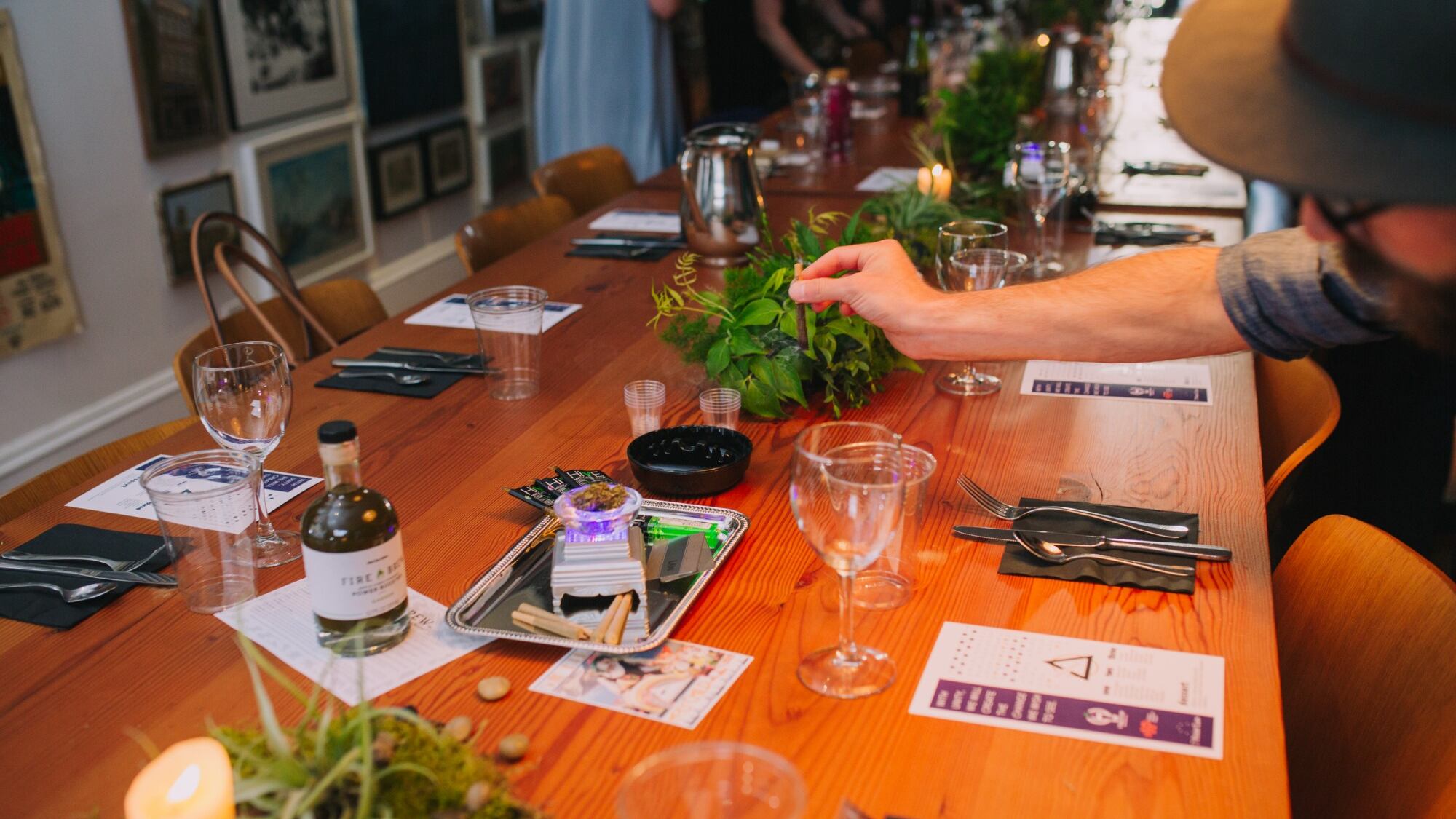Except for the labels on the cannabis, it looks like a Soho loft party.
Natural light colors the city-block-long room in Southwest Portland, occupied by a snaking arrangement of tables set for 75 dinner guests.
Nearby, a DJ spins downtempo, clubby beats, and a caterer holding a tray of petite glassware approaches and offers me the evening's amuse-bouche, a white gazpacho—delicious and thick with an aromatic, garlic kick. At the center of the room, attendees mingle at the long hardwood bar, where Coalition Brewing runs taps of their new CBD-infused beers, while an array of vendors from the cannabis industry give hands-on tours of their products.
A man whose name I never catch passes me a finger-wide cone of Lemon Skunk as I inspect from a distance jars of flower produced by Holy Child Farms. The growers, noting my hesitation, assure me: "It's not a dispensary."
Down the bar is a tasting area for High Desert Pure cannabis extracts, where a dab station is in full swing and cartridge-based oil pens are lined up for sampling. Adjacent is Hive, serving up sticks of honey infused with either THC or CBD.
This is Arcane Revelry, a pop-up dinner series branded as "cannabis culture by invitation only." Tickets are $75, and everything—the flower, the dabs, the infused beer, the white gazpacho—is all-inclusive. Tonight is the second-ever event in the series, featuring a four-course meal by Pozole to the People's Chris Bailey and speakers from organizations like the Oregon Innocence Project, a nonprofit that provides free legal help to Oregonians they believe are falsely imprisoned.
Arcane Revelry co-founder Crystal Feldman hatched the idea for her cannabis dinner during a religious dinner—a Seder celebration that featured cannabis instead of sacramental wine. This is in keeping with tradition, she says. "Ancient Jewish law and tradition speaks specifically about cannabis consumption in rituals for the purpose of connecting with spirit," says Feldman.
That Seder ceremony was a sort of coming out for many in attendance. People who would never break out a joint in other settings for fear of professional or social repercussions suddenly found themselves sharing the sacred herb and discovering their mutual adoration for humanity's oldest, favorite plant.
Feldman realized that the cannabis industry itself could benefit from a similar safe space for people to connect, hang out and finally share an opportunity to legally consume weed as a community.
It sounds like a no-brainer—gathering cannabis professionals in a place where they can comfortably smoke together—but it's not as easy as it sounds.
Presently, Oregon's Indoor Clean Air Act makes it so, just like tobacco, cannabis cannot be consumed at public venues like bars and social clubs. Additionally, the way cannabis laws are currently written, smoking outside in public view is a no-go, and therefore, the only legal option is to consume in a private residence.
This raises issues not just for people looking for social spots to consume and mingle, but for tourists staying in places subject to the Indoor Clean Air Act, and for people living in buildings where smoking is prohibited. Oregon Senate Bill 307 aims to rectify the situation by creating a legal framework for licensed cannabis consumption venues, but the law hasn't yet been approved and many consumers are presently without provisions for safe spaces to smoke.
Feldman and other proponents of SB 307 say it's not just an issue of equitable access; it's also a matter of managing public image.
If the only ways to smoke weed are to do so either as a shut-in or as a criminal, naysayers can politicize and manipulate that perception to block cannabis reform. Arcane Revelry is designed to offer an alternative to those images, and a vision of what a future cannabis culture might look like.
Of course, Arcane Revelry is as utopian as it is exclusive, but without events of this nature it could be hard to imagine what responsible public weed use could look like, given some regulatory and infrastructural development. And without an example to work toward, garnering the support and advocacy of community influencers can be an abstract task.
"If we set the example of the change we wish to see, we better our community and promote tolerance for our children and future generations," says Feldman.
And if that means beginning with Le Pigeon so someone can start a dive bar for the little guy, then bring on the fancy.

